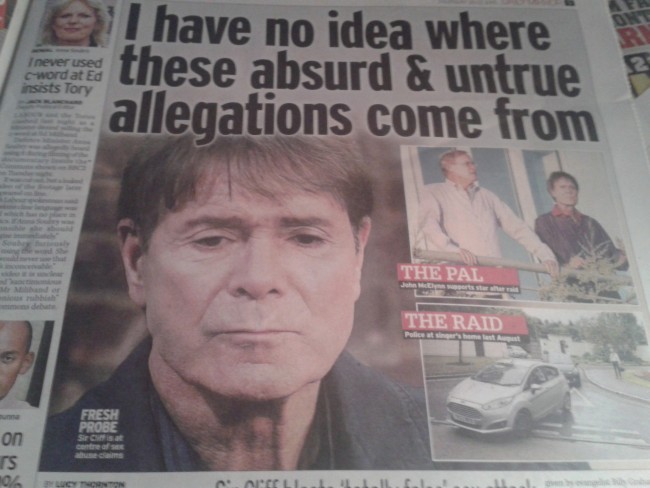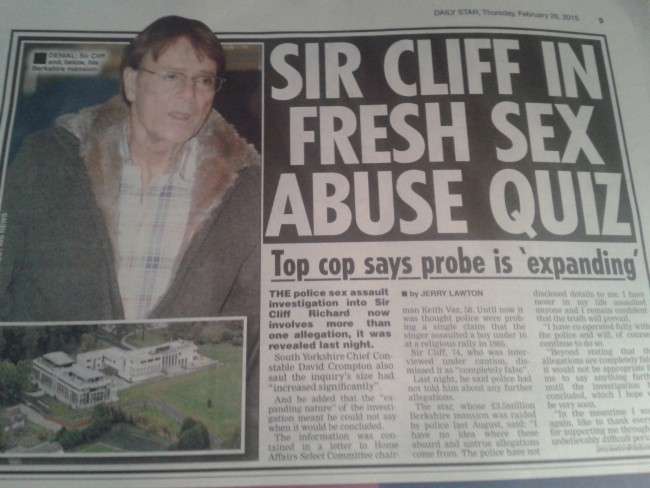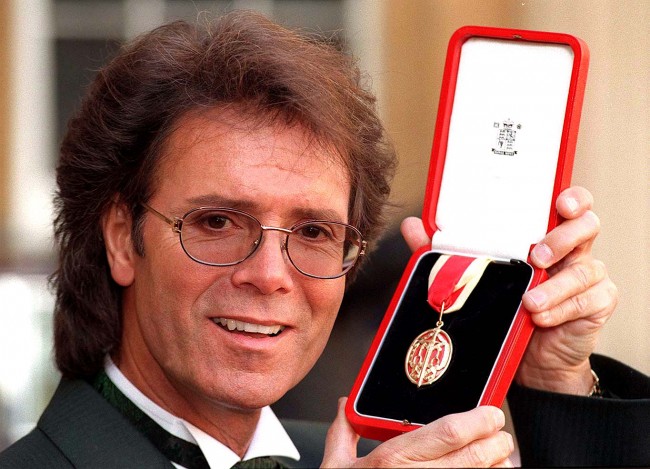Sir Cliff Richard: victim of the paedo inquisition
In the post-Savile era, the BBC is so desperate to look decent and worthy that it broadcast live a police raid on an innocent man’s home. The celebrity in the Beeb’s cross-hairs was Sir Cliff Richard, who had been implicated in an incident at a Billy Graham evangelist rally in Sheffield in the 1980s involving a boy under the age of 16. The Metropolitan Police’s Operation Yewtree shoved the allegation on to South Yorkshire Police in June 2014. A month later the police and the State broadcaster colluded in the interests of “breaking news” and PR to show us Cliff’s home being turned over. He was out at the time. It was revolting stuff. But it wasn’t out of keeping with the BBC and police’s frenzied pursuit of salvation and purpose, in which accusers became ‘victims’, accusations are considered “credible and true” and the accused branded guilty without any need for such nuisances as evidence, proof and a trial.
Sir Cliff, who was told in 2016 that he’d face no charges, sued. And yesterday the 77-year-old singer was awarded £210,000 in damages. More damages are sure to follow. South Yorkshire Police has already paid £400,000 in damages.
Mr Justice Mann told the court:
“The material at trial demonstrated not only that people were very excited at the prospect of this scoop, but also that they were very keen to preserve it as their own. The latter point is demonstrated by a number of things, including the very questionable (in contractual terms) exclusion of ITN from knowledge of the launch of the helicopter and the fear, expressed in emails, that Sky News might pick up the event.
“I think and find it likely that this is what motivated the BBC in relation to timing at the end of the chain of events. It was important, if possible, to get the news to broadcast for 1pm (ITN would have a lunchtime broadcast at 1.30pm), rather than waiting any longer.
“That led the BBC to truncate, unfairly, the opportunity for Sir Cliff to get in a reply before the first broadcast.
“I emphasise that I am not finding that there is anything inherently wrong with a desire to beat a rival to a story. What happened in this case was that that view unduly skewed other judgments that had to be made.”
This was the stodgy BBC engaging in competitive journalism with commercial broadcasters. It wanted to use Sir Cliff to prove that in the new arena it too could shout “First!” The police used the reality show to trawl for more ‘victims’.
BBC News director Fran Unsworth has issued an apology, albeit one with a sympathetic back story and mealy-mouthed lament:
“We are sorry for the distress that Sir Cliff has been through. We understand the very serious impact that this has had on him. We have thought long and hard about how we covered this story. On reflection there are things we would have done differently, however the judge has ruled that the very naming of Sir Cliff was unlawful.”
Why name an innocent man? Was he a danger to the public? Was Cliff more Pied Piper than Peter Pan? What evidence did the police hope to find at his unoccupied home? What would this compelling evidence look like on the telly? Where was Sir Cliff – wasn’t he the story, rather than his house?
“So even had the BBC not used helicopter shots or ran the story with less prominence, the Judge would still have found that the story was unlawful; despite ruling that what we broadcast about the search was accurate.”
Man has home searched. Fact. Broadcasting it live and naming the celeb, who must be presumed innocent to showcase your own sound morals. Sensationalist horror show. This is a pathetic apology.
“This judgment creates new case law and represents a dramatic shift against press freedom and the long-standing ability of journalists to report on police investigations, which in some cases has led to further complainants coming forward.”
Trawling for ‘victims’ on a live reality TV show is not an investigation, at least not one any sensible and circumspect institution should be dabbling in.
And it could be you:
“This impacts not just the BBC, but every media organisation. This isn’t just about reporting on individuals. It means police investigations, and searches of people’s homes, could go unreported and unscrutinised.”
Balls. The BBC went for Sir Cliff because he is famous.
“It will make it harder to scrutinise the conduct of the police and we fear it will undermine the wider principle of the public’s right to know. It will put decision-making in the hands of the police.”
If it is so awful, how the bloody hell did you – top State-approved journalists – all agree it was a good idea? Why didn’t the BBC apologise earlier? Why did the BBC fight the case? Has anyone been sacked? Will ‘lessons be learned’?
Ubiquitous Tory MP Anna Soubry has called for “Cliff’s Law” to ban media from naming suspects before they are charged. Oh, the sick irony of Sir Cliff having his own law, thus cementing his name with an accusation of which he is entirely innocent. Bad practice makes for bad laws. Soubry is as vain and monocular as the BBC reporters who sought to make names for themselves on Sir Cliff’s back.
“We don’t believe this is compatible with liberty and press freedoms – something that has been at the heart of this country for generations. For all of these reasons, there is a significant principle at stake. That is why the BBC is looking at an appeal.”
Ha. So much for the apology. The show goes on…
Posted: 19th, July 2018 | In: Celebrities, Key Posts, News 0 Comments | TrackBack | Permalink





